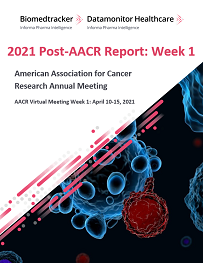Report Library
All Reports
2021 Biomedtracker / Datamonitor Healthcare Post-AACR Report: Week 1
April 23, 2021
The American Association for Cancer Research (AACR) 2021 Annual Meeting Week 1 was held virtually from April 10-15, 2021. The meeting included preclinical and early clinical results from oncology drug candidates, but investigators also presented updated results from several key clinical trials. Included below are selected highlights from the meeting:
- Bayer presented the first numerical data from CHRONOS-3, a Phase III trial evaluating Aliqopa combined with rituximab in second-line or later patients with indolent B cell lymphoma. The Aliqopa/rituximab combination showed improved PFS compared to rituximab across several different types of lymphomas, including follicular lymphoma (22.2 vs 18.7 months), marginal zone lymphoma (22.1 vs 11.5 months), small lymphocytic lymphoma (14.2 vs 5.7 months), and Waldenström macroglobulinemia (33.4 vs 16.6 months). All of these improvements were statistically significant, except for Waldenström macroglobulinemia (p=0.054), which had the smallest sample size. There are currently four PI3K inhibitors approved for follicular lymphoma: Zydelig, Copiktra, and Aliqopa in the third-line or later setting and Ukoniq in the fourth-line or later setting. These drugs were all approved as monotherapies based on Phase II trials. The positive results from CHRONOS-3 should support additional approvals for Aliqopa including an sNDA for follicular lymphoma as well as an NDA for marginal zone lymphoma, both in the second-line or later setting.
- Affimed presented initial data from a Phase I trial evaluating AFM13, a CD16A/CD30 bispecific antibody, complexed with allogeneic cord blood-derived natural killer cells. The 100% ORR (50% CR) in the first four patients is very encouraging as AFM13 previously reported an ORR of just 17% as monotherapy. There were signs of a dose-response relationship, with the three low-dose patients responding only after the second cycle. Only one patient has been treated at the intermediate dose and had a complete response after the first cycle. There were no observed events of cytokine release syndrome, neurotoxicity syndrome or graft-versus-host disease. The investigator explained that complexing the NK cells with AFM13 gives them chimeric antigen receptor (CAR)-like properties but without the manufacturing complexity. For now, we await updated data from this Phase I/II trial.
- Immunocore released the first numerical results for the Phase III IMCgp100-202 study of its experimental bispecific T-cell engager (BiTE) tebentafusp in uveal melanoma. These show a 1-year OS of 73.2%, significantly outperforming the available standard-of-care (predominantly off-label PD-1 inhibitors) at 58%. As no targeted drugs are yet approved, such findings have the potential to substantially improve patient outcomes for the rare disease. Tebentafusp’s performance has implications beyond its niche application in uveal melanoma as IMCgP100-202 marks the first late-phase trial data showing a BiTE with a clearly superior clinical profile to standard-of-care PD-1 antibodies – a potential milestone in the development of next-generation immunotherapies.
- Otsuka’s novel FGFR inhibitor futibatinib showed promising results in the FOENIX-CCA2 trial for previously-treated FGFR mutant cholangiocarcinoma. Notably, the recorded ORR of 41.7% compares well to those of rival FGFR inhibitors for infigratinib and pemigatinib observed in similar patient populations. These results may be sufficient for a regulatory submission in this setting, where futibatinib will compete directly with the former two drugs. They also bode well for the ongoing Phase III FOENIX-CCA3 trial in the larger first-line setting, where futibatinib is also expected to compete with infigratinib and pemigatinib.
- First numerical data from the Phase III CheckMate-816 trial testing the combination of Opdivo and platinum chemotherapy as an adjuvant treatment for patients with resectable non-small cell lung cancer (NSCLC) were presented. It is impressive that 24% of patients treated with Opdivo plus chemotherapy prior to surgery achieved a pathological complete response (pCR), particularly since only 2.2% of patients treated with chemotherapy alone achieved a pCR. However, data for the co-primary endpoint of event-free survival (EFS) will likely be needed to support an approval in this setting.
- Initial results from the Phase II trial of AbbVie’s telisotuzumab vedotin in patients with previously treated c-MET+ advanced NSCLC were presented. Although telisotuzumab vedotin demonstrated modest efficacy in the squamous and EGFR-mutant cohorts, the 35.1% overall response rate in the non-squamous EGFR wild-type cohort was promising, particularly since 73% of patients had previously received checkpoint inhibitors. These preliminary data suggest that telisotuzumab vedotin will likely be competitive with the other therapies in development for this patient population.
- Sanofi presented initial results from the Phase I/II HAMMER trial show preliminary efficacy for their “not-alpha” IL-2 inhibitor, SAR444245 (THOR-707). The drug increased signs of immune activity, including increased CD8+ T cell and NK cell counts. This resulted in early signs of clinical efficacy with two complete responses achieved in patients with head and neck cancer and basal cell carcinoma, respectively. Notably, SAR444245 did not demonstrate class-associated adverse events like vascular leak syndrome and eosinophilia. However, Grade 3/4 CRS and liver toxicity was observed. Phase II investigation in solid tumors is initiating shortly.
Like our report? Have any questions or feedback? Please let us know at askanalyst@sagientresearch.com.
For our disclosures, please read the Biomedtracker Research Standards.
| Disease Group Covered: | Oncology |
Additional Resources:
- Datamonitor Healthcare Oncology: NHL: Mantle Cell Lymphoma (MCL) Market Spotlight
- Datamonitor Healthcare Oncology Disease Analysis: HR+/HER2- Breast Cancer
- Datamonitor Healthcare Oncology Disease Analysis: Non-Small Cell Lung Cancer (NSCLC)
- Datamonitor Healthcare Oncology Disease Analysis: Hepatocellular Carcinoma (HCC)
- Biomedtracker / Meddevicetracker Q2 2021 Outlook Report
